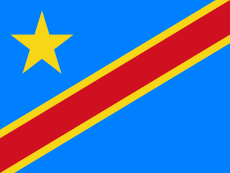Languages of the Democratic Republic of the Congo
| Languages of the Democratic Republic of the Congo | |
|---|---|
| Official languages | French |
| National languages | Kituba, Lingala, Swahili and Tshiluba |
| Indigenous languages | More than 200 |
| Sign languages | American Sign Language (Francophone African Sign Language) |
| Lingua franca | French, Kituba, Lingala, Swahili and Tshiluba |
| Part of a series on the |
| Culture of the Democratic Republic of the Congo |
|---|
 |
| History |
| Languages |
| Cuisine |
| Religion |
|
Music and performing arts |
|
Media |
|
Symbols
|
|

The Democratic Republic of the Congo is a multilingual country where an estimated total of 242 languages are spoken. Ethnologue lists 215 living languages.[1] The official language, inherited from the colonial period, is French. Four indigenous languages have the status of national language: Kituba (called "Kikongo"), Lingala, Swahili and Tshiluba.
When the country was a Belgian colony, it had already instituted teaching and use of the four national languages in primary schools, making it one of the few African nations to have had literacy in local languages during the European colonial period. During the colonial period both Dutch and French were the official languages but French was by far the most important.
French
French is the official language of the country since its colonial period under Belgian rule. Therefore, the variety of French used in the DRC has many similarities with Belgian French. French has been maintained as the official language since the time of independence because it is widely spoken around the educated groups in the country, it belongs to none of the indigenous ethnic groups and eases communication between them as well as with the rest of the Francophonie, which includes many African countries. According to the OIF,[2] 6,080,000 or 10% of the population were proficient French speakers in 2005 whereas another 18,240,000 or 30.0% were partially French speaking. The Democratic Republic of the Congo is currently the most populous French-speaking country outside of France.
Kikongo
The constitution says Kikongo is one of the national languages, but in fact it is a Kikongo-based creole creole, Kituba (Kikongo ya Leta "Kikongo of the government", Leta being derived from French l'État "the State") that is used in the constitution and by the administration in the provinces of Bas-Congo (which is inhabited by the Bakongo), Kwango, and Kwilu. Kituba has become a vernacular language in many urban centres including Kikwit, Bandundu, Matadi, Boma and Muanda.
Lingala
Lingala is a language which gained its modern form in the colonial period, with the push of missionaries to uniformize and teach a local vehicular language. It was originally spoken in the upper Congo river area but rapidly spread to the middle Congo area and eventually became the major Bantu language in Kinshasa for many reasons.
Lingala was made the official language of the army under Mobutu, but since the rebellions the army has also used Swahili in the east. With the transition period and the consolidation of different armed groups into the Congolese Army, the linguistic policy has returned to its previous form and Lingala is again the official language of the Army.
Swahili
Swahili is the most spoken vehicular language spoken in Eastern Equatorial Africa. Many variations of Swahili are spoken in the country but the major one is Kingwana, sometimes called Copperbelt Swahili, especially in the Katanga area.
Tshiluba
The constitution does not specify which variation of Tshiluba is a national language. There are two major variations of Tshiluba: Luba-Kasai, spoken in the East Kasai Region (Luba people) and Luba-Lulua, in the West Kasai Region (Bena Lulua people). Luba-Kasai seems to be the language used by the administration. A related language, known as Luba-Katanga, is spoken in Katanga Province.
Sign languages
There are 12 deaf institutions in the country, most teach French Sign Language or variations. American Sign Language is also practiced in the country.
Other languages
The most notable other languages of the Democratic Republic of the Congo are Mongo, Lunda, Kilega, Tetela, Chokwe, Budza, Ngbandi, Lendu, Mangbetu, Nande, Ngbaka, Mashi, and Eborna.
As of 2010 the government decided to include Portuguese as an optional language at schools as a reflex of the increasing influence in the continent.[3]
Among the slangs spoken in Congo, Indubil has been noted since around the sixties[4] and continues to evolve nowadays.[5]
External links
- Linguistic map of the Democratic Republic of the Congo from Muturzikin.com
- Ethnologue.com: Ethnologue report for the Democratic Republic of the Congo
- PanAfrican L10n: Democratic Republic of Congo, languages and software localization
- (French) Linguistic situation in RDC
- (French) New Technologies and languages of both Congos
- (French) ONG Éveil du Congo, NGO working in localization and translations in Congolese national languages
References
- ↑ Languages of Democratic Republic of the Congo, ethnologue.com
- ↑ http://20mars.francophonie.org/IMG/pdf/FICHE_03_Nombre_de_francophones.pdf
- ↑ TSF. (July 4th). Português adoptado como língua opcional nas escolas da RD Congo, accessed on July 4, 2010
- ↑ "Ghetto Blaster : Et la rumba congolaise rythma les indépendances". Retrieved 20 February 2011.
- ↑ Georges Mulumbwa Mutambwa. "The spread of Indubil through DR Congo: context and modalities". Retrieved 20 February 2011.
| ||||||||||
| ||||||||||||||||||||||||||||||||||||||
| ||||||||||||||